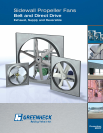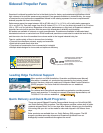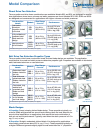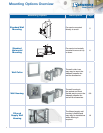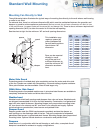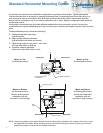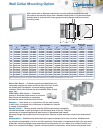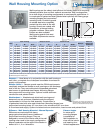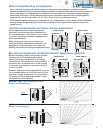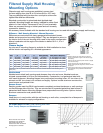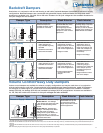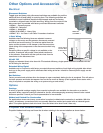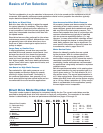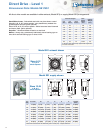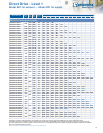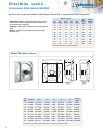
6
Horizontally mounted fans are available for applications requiring vertical airflow. Typical applications
include mounting fans in ductwork or plenums as transfer fans or suspending them from the ceiling in a
wall housing for use as recirculation fans. Both belt and direct drive fans can be horizontally mounted.
Motors can be mounted on top or on bottom with airflow up or down. Specify configuration best suited for
access and service.
Horizontally mounted fans are put under different stresses than fans mounted in a wall. Construction
modifications are required depending on motor location (top or bottom) and whether the fan is belt or direct
drive.
These modifications may include the following:
A - Grooved shaft with snap rings
(belt drive fans)
B - Motor pulley retaining hardware
(belt drive fans with motor on bottom)
C - Reinforcing angles on fan panel - not shown
(all fans with motor on bottom)
D - Propeller retaining hardware
(direct drive fans with motor on top)
Motor on Top
Air Blowing Upward
Motor on Bottom
Air Blowing Upward
(Shown as suspended
installation with fan
mounted in wall housing.)
Standard Horizontal Mounting Option
NOTE: Protective guarding is also required below the fan for safety. When guarding is not ordered with the fan, it must
be supplied by the installer. When specifying a fan for horizontal mounting, the motor location (top or bottom)
and airflow (upward or downward) are required information.
Motor on Top
Air Blowing Downward
Motor on Bottom
Air Blowing Downward
(Shown as suspended
installation with fan
mounted in wall housing.)
Airflow
Airflow
Wall
Housing
Guard or Diffuser
Hangers by others
Airflow
Airflow
D - Retaining Hardware
Guarding is strongly
recommended
Supply Fan
Supply Fan
Exhaust Fan
Exhaust Fan
A
B



